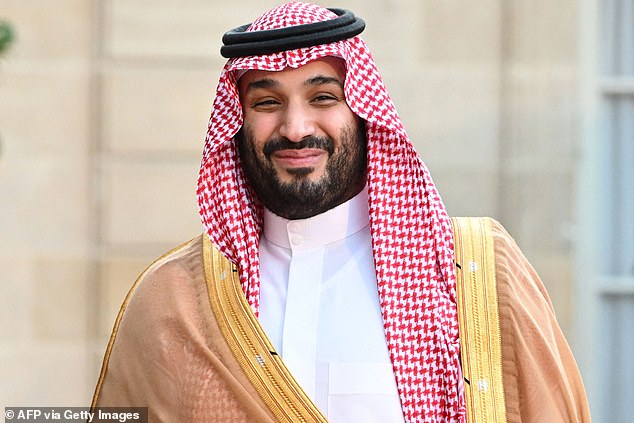Saudi Arabia beheads seven prisoners in one day after accusing them of ‘terrorism’ and ‘endangering national security’
Saudi Arabia executed seven people on Tuesday for “terrorist” crimes, state media said, the highest single-day figure since 81 people were put to death in March 2022.
The seven were convicted of “creating and financing terrorist organizations and entities,” the official Saudi Press Agency said, citing the Gulf kingdom’s interior ministry.
Saudi Arabia, one of the world’s most prolific users of the death penalty, has now executed 29 people this year.
The nationalities of the seven people executed Tuesday were not disclosed, but their names and titles indicated they were Saudi.
They were convicted of ‘adopting a terrorist approach that involves bloodshed, establishing and financing terrorist organizations and entities, and communicating and dealing with them with the aim of disrupting the security and stability of society’ and national security in danger, the official news agency said. .
Saudi Arabia, one of the world’s most prolific users of the death penalty, has now executed 29 people this year. The most in one day was 81 in March 2022. (Stock image).
The report provided no further details about the allegations against them.
The kingdom, infamous for beheadings, drew a wave of condemnation from around the world with 81 executions in one day in 2022.
That year, Saudi Arabia executed a total of 196 people.
In 2022, Saudi Arabia executed more people than any other country except China and Iran, according to Amnesty International.
According to an AFP review of official announcements, 170 people were put to death in 2023.
In September, with the number approaching 100, Heba Morayef, Amnesty International’s Middle East and North Africa Director, said: “In stark contrast to Saudi Arabia’s repeated pledges to limit the use of the death penalty, the Saudi authorities have already executed 100 people this year, revealing their chilling disregard for the right to life.
The authorities’ brutal killing spree raises serious fears for the lives of young men on death row who were under 18 years old at the time of the crimes.
‘Saudi Arabia is one of the biggest executioners in the world.
‘Amnesty International has documented numerous cases where authorities have sentenced people to death for everything from a few tweets to drug-related crimes, after grossly unfair trials that fell far short of international human rights standards.
“In August alone, Saudi Arabia executed an average of four people a week, including a Pakistani man executed for drug smuggling.
‘The death penalty is prohibited under international law for drug-related crimes that do not fall under the category of ‘most serious crimes’.
The Arab nation clearly ignored Amnesty’s comments as December was the bloodiest month of that year with 38 executions.
Last year’s executions included 33 people accused of terrorism-related crimes and two soldiers convicted of treason.
Saudi authorities consider the executions necessary to “maintain public order” and compatible with their interpretation of Sharia, the Islamic law code based on the teachings of the Koran.

Executions undermine the image of a more open, tolerant society central to Prince Mohammed’s Vision 2030 reform agenda, activists claim
Activists say the kingdom’s continued embrace of the death penalty is hurting efforts by de facto ruler Crown Prince Mohammed bin Salman to transform the world’s largest crude oil exporter into a business and tourism hub.
Executions undermine the image of a more open, tolerant society that is central to Prince Mohammed’s Vision 2030 reform agenda, activists argue.
In some ways, Saudi Arabia is trying hard to be considered a modern country.
With tourism projects led by Crown Prince Mohammed Bin Salman, such as Neom and The Line, trying to capture the wonder of the West and grow the country economically.
